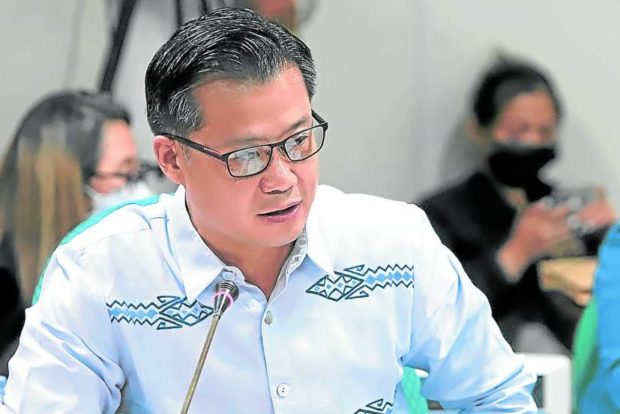
Sen. Sherwin Gatchalian (File photo from the Senate Public Relations and Information Bureau)
MANILA, Philippines — The recent ruling by the Supreme Court that voided the 2005 joint oil and gas exploration agreement among the Philippines, China, and Vietnam may have also dimmed the prospect of a similar deal just between Manila and Beijing, according to Sen. Sherwin Gatchalian.
Gatchalian, who headed the Senate energy committee in the previous Congress, said that the high court outlined the parameters within which the Philippine government could undertake a joint exploration of resources in its territory with a foreign entity, which were unacceptable to China.
“Personally, I’m not so optimistic that we can move forward with this joint exploration [with China],” he said in an interview with ANC on Saturday.
“It’s good that we are talking. It’s good that we are open to it, but when you go to the nitty-gritty of things, especially the governing law that should prevail, we hit a snag,” he said.
Gatchalian, who now heads the Senate ways and means committee, made the statement after the Chinese government said it would still push for joint oil exploration in the South China Sea with the Philippines despite the adverse court ruling.
Signal from Xi
During his Jan. 3 to 5 visit to China, President Ferdinand Marcos Jr. said he welcomed Chinese President Xi Jinping’s offer to resume joint oil and gas exploration talks, which his predecessor terminated due to constitutional constraints.
A week before President Rodrigo Duterte stepped down on June 30 last year, then Foreign Secretary Teodoro Locsin Jr. announced that the talks were “terminated completely” and that “nothing is pending.”
In 2018, the Philippines and China signed a memorandum of understanding on cooperating in offshore oil and gas development.
Locsin said the development of oil and gas resources that are critical for the Philippines should not be “at the price of sovereignty; not even a particle of it.”
Deal during Arroyo time
On Jan. 11, less than a week after Marcos returned from Beijing, the Supreme Court announced its ruling.
It said that the 2005 three-party Joint Marine Seismic Understanding, which covers 142,886 square kilometers of the South China Sea, including Philippine waters, violated the Constitution for allowing wholly-owned foreign corporations to explore the country’s natural resources.
The court said the agreement was pursued by the Arroyo administration “without observing the safeguards” provided for the country’s natural resources by Section 2, Article XII of the 1987 Constitution.
“That the Parties designated the joint research as a ‘pre-exploration activity’ is of no moment. Such designation does not detract from the fact that the intent and aim of the agreement is to discover petroleum which is tantamount to exploration,” the court ruled.
Zubiri: Study ruling
A day after the ruling was made public, Senate President Juan Miguel Zubiri said the government should “very carefully” study the Supreme Court decision in relation to any resumption of oil exploration talks with China.
The Senate leader said the government could now be prohibited from allowing other countries with maritime claims in the South China Sea to join the Philippines in searching for oil and gas in any part of the country’s 370-kilometer exclusive economic zone (EEZ).
“Does the Supreme Court mean that if we, for example, do exploration in Pagasa Islands, [it] should be wholly a Filipino undertaking? With this decision, that’s my understanding,” Zubiri said.
“My suggestion to the administration is tread cautiously when it comes to long-term contracts with joint exploration with different claimant countries,” he said.
The Philippines and several of its neighbors claim parts of the South China Sea but China claims almost all of it, including the West Philippine Sea, waters within the country’s EEZ, along with its oil and gas deposits and traditional fishing grounds.
A 2016 ruling by an international arbitral tribunal reaffirmed Philippine sovereignty over its EEZ and invalidated China’s claims. Beijing has refused to recognize the decision.
‘More complex’
Gatchalian said the Duterte administration “tried very hard” to pursue the joint exploration deal with China, even forming a technical working group to “narrow down” in fine detail the terms of the “complex” agreement.
“Obviously, after four years [of negotiations], nothing happened and obviously, it’s more complex than what they thought and obviously, there are a lot of things that they (Philippines and China) cannot agree on,” he said.
The Supreme Court considers pre-exploration already an exploration, according to Gatchalian.
“Our minimum standard is that it is within our exclusive economic zone, therefore our law should govern. Our Constitution should be the enabling document, and that’s our minimum standard and if China cannot follow that, then this is where the complexity will come in,” he said.
Considering that a deal with China was unlikely to happen, Gatchalian said the Philippine government should explore “all possibilities” in its aim to harness its offshore oil and gas resources.
“The West Philippine Sea is the most prolific when it comes to oil and gas and it’s to our interest to be energy secure. Therefore, we should explore the potential of the West Philippine Sea,” he said.
“So yes, we can, but the West Philippine [Sea] issue is much more complex because China is claiming it, and that becomes an uncertain factor in terms of how to move forward with oil and gas exploration,” he said.